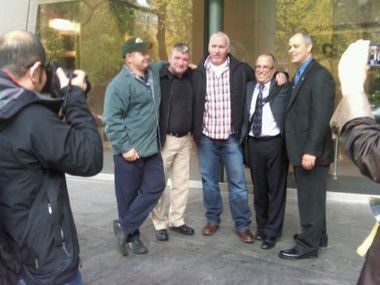Due to the large number of contractors contacting us about Lung problems after working in Iraq and Afghanistan we’ll be investigating and posting all information we can find on this topic. Please forward any information you may have to dbacasualty@yahoo.com.
Channel 4 News from August 2011
 US soldiers returning from Iraq and Afghanistan with an apparently untreatable and incurable lung disease are being dismissed as out of shape because tests appear normal, writes Sarah Jones.
US soldiers returning from Iraq and Afghanistan with an apparently untreatable and incurable lung disease are being dismissed as out of shape because tests appear normal, writes Sarah Jones.
A civilian physician who has diagnosed more than 50 soldiers with constrictive bronchiolitis says the life-altering disease is linked to service in Iraq and Afghanistan.
Dr Robert Miller, of Vanderbilt University, says: “This scarring of the small airways in the lungs is common in people who have had bone marrow transplants or lung transplant rejection not people who have passed military fitness exams.
I get shortness of breath and painful burning in my lungs after running just a quarter of a mile, I can’t run any more Dr Sylvia Waters
“What we can say is that this disorder is linked to service in the Middle East. But we haven’t been able to definitively link what the cause is for the black lacy pigment. It’s something that’s inhaled that shouldn’t be there.”
Last month the New England Journal of Medicine published a study by Dr Miller and colleagues which documented the condition of soldiers who had served in Iraq and Afghanistan and were diagnosed with constrictive bronchiolitis.
However, their analysis doesn’t reveal how common the condition is in troops or positively identify the cause of constrictive bronchiolitis in troops.
‘Black lacy pigmentation’
The diagnoses were made after lung biopsies. At least half the soldiers have left the service with a disability rating making them eligible to receive anywhere between $123 to over $3,100 per month depending on the level of their disability and number of dependents.
In certain instances the Department of Veterans Affairs recognises a link between the disorder and service. But compensation is based on pulmonary function testing (PFT) and soldiers with constrictive bronchiolitis have normal PFT results despite having scarring of the airways, black lacy pigment in their lungs and severe exercise limitations.
A further complication is that deployed troops do not receive pre- and post-deployment pulmonary function tests that could help doctors know the extent of lung damage.
Dr Sylvia Waters serves in the US army and is a practicing anaesthetist. She used to run every day but after serving in Iraq she had to give up her passion.
“After a six-month tour in Mosul, Iraq I get shortness of breath and an excruciating burning in my lungs after running just a quarter of a mile. I can’t run any more.”
Army physicians tried routine tests including X-rays, pulmonary function tests and chest CT scans. They tried inhalers and steroid treatments but nothing worked and all tests results kept coming back normal.
At times, Dr Waters says she doubted herself: “I felt like I was going crazy because all these physicians kept telling me everything was coming back negative.
“It was only the fact that I was a physician and I knew other doctors that I even got diagnosed because I don’t know how else I would have done it.”
Please read the entire story here

